
Melanie was herding cattle at age seven. Linnea claims she didn’t quite have her work ethic dialed in till closer to age ten. From picking hard battles to picking each other up, the seven Elzinga sisters of Alderspring Ranch Don’t Go Gently. With the mentorship of their parents, they’ve grown into confident, multi-faceted individuals who’ve learned to question “what’s always been done,” and through that creativity, they’ve ushered their Idaho ranch into a new era ready to provide carbon-negative beef for a new generation.
The sisters — Melanie, Abigail, Linnaea, Emily, Rebekah, Annie, and Maddy have grown into strong, capable, articulate, passionate women whose fingerprints leave the world better than they found it. These women boast degrees in Ecology, Music, Horsemanship, Business/Entrepreneurship Management, Physics, and Computer Science with hobbies that range from music to backcountry skiing. What unites them is their love for their family, the land, and what Alderspring Ranch means for the next generation of agriculturalists. Despite participating in an industry that hemorrhages its youth to city life, nearly all of these women plan on lending their gifts and expertise to the continuation of Alderspring Ranch.

From left to right: Rebekah Elzinga, Emily Elzinga, Melanie Elzinga, Annie Elzinga, Maddy Elzinga, Linnaea Elzinga, and Abigail Kelly
We had a chance to sit down with some of these women, and learn just how the Elzingas broke the mold, and recast an example that counters the cultural norms and gives hope to the next generation.
What are some of your earliest memories of helping out on the ranch?
MELANIE:
Until I was about 12, we ran cattle on a smaller ranch in the Lemhi Valley, the next valley north of where we currently ranch in the Pahsimeroi Valley. I was always “helping” my dad as he worked, whether that was riding along in the passenger seat of the beat-up pickup truck as he drove out to check calving momma cows or trailing along behind him on my very first horse, a very sanguine and kind mare named Bonny.
One day stands out in my memory. My dad and I had been gathering and working cattle all day and it was starting to get dark. It was late fall and cold. My six- or seven-year-old self was frozen, exhausted, and hungry. Bonny and I were bringing up the back of the herd and it began to snow, big white flakes falling through the leaden sky. I began to cry. Dad rode back to me on his big bay mare. “Do you need to go home? You can go back and get warmed up.” I tried to keep the tears from my voice as I responded: “No. I want to stay and finish.” The truth is, I did want to stay. It was important to me to finish the job and do right by my dad and the animals in our care, miserable as I was. Over the years, my sisters and I learned that the true reward was in finishing a job to the best of our abilities and that was one of the first times I recognized it.

LINNAEA:
The clearest memories are the ones with lessons that still echo in my mind today. A few weeks ago I was riding through a patch of thick sagebrush on the range, and I was brought instantly back to Dad telling 10-year-old me to watch out for snakes perched in the sage in that very spot. I was out in the field setting up some electric fence a few days ago and I remembered learning a hard lesson there as a kid about work ethic (the issue was that I didn’t have one at the time). The unique thing about growing up on the land is that every rock, tree, and patch of ground has a story or a memory tied to it.
REBEKAH (BECKY):
Some of my earliest memories of helping out on the ranch were not really things that were necessarily that helpful. Like the first time I ever drove the feed truck, Dad put it in the lowest gear, told me not to touch any of the pedals (not that I could’ve reached them anyway), and then told me to just keep the truck going straight which was something the truck could’ve done without me behind the wheel but I enjoyed feeling like I was helping.
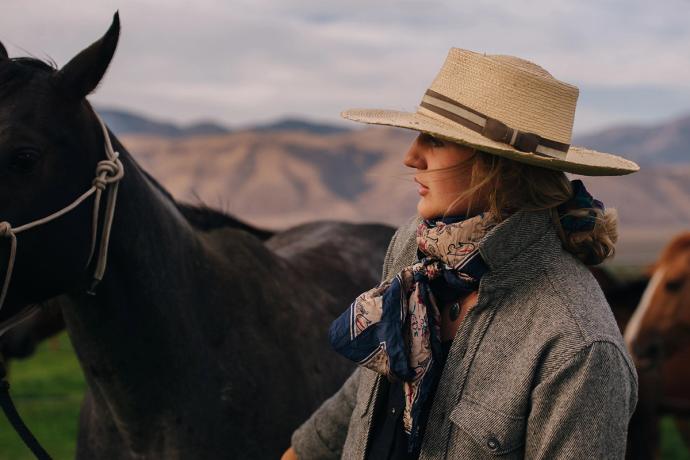
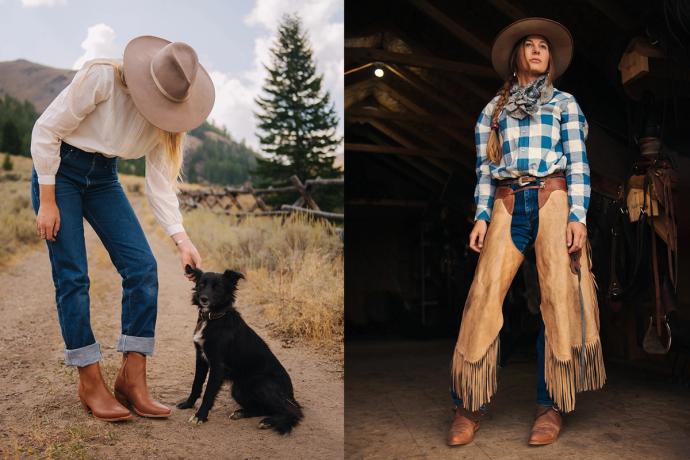
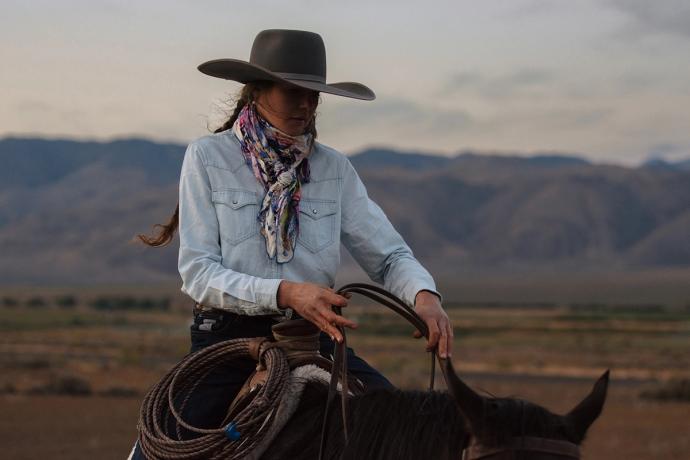
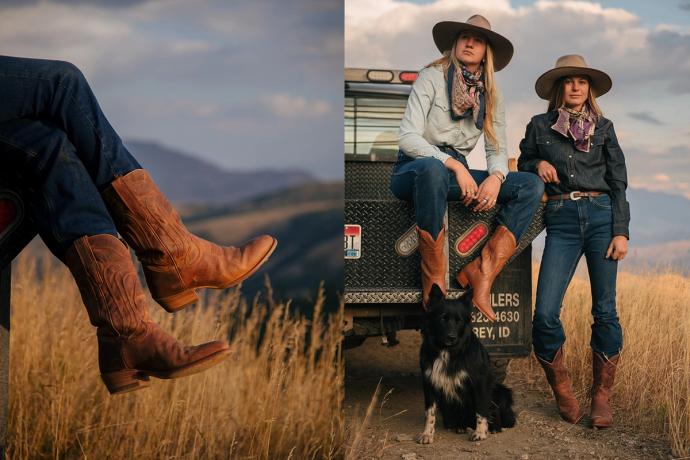
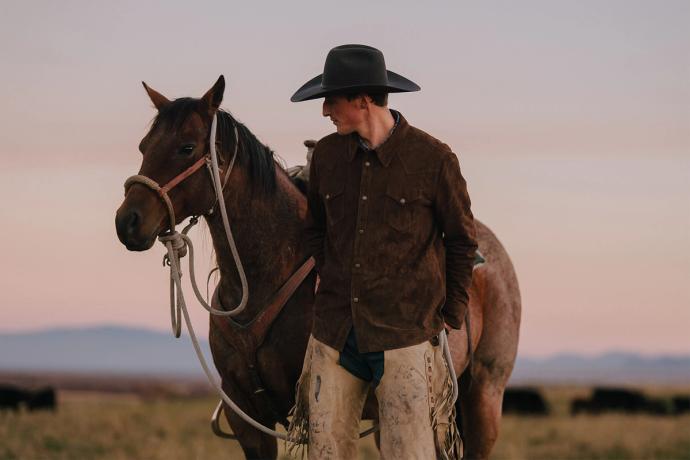
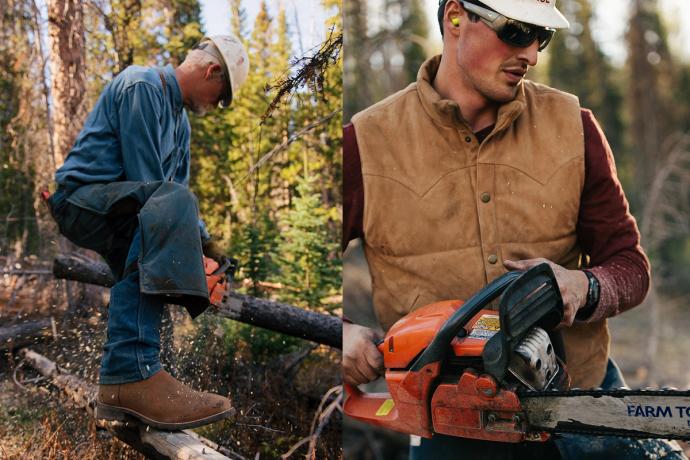
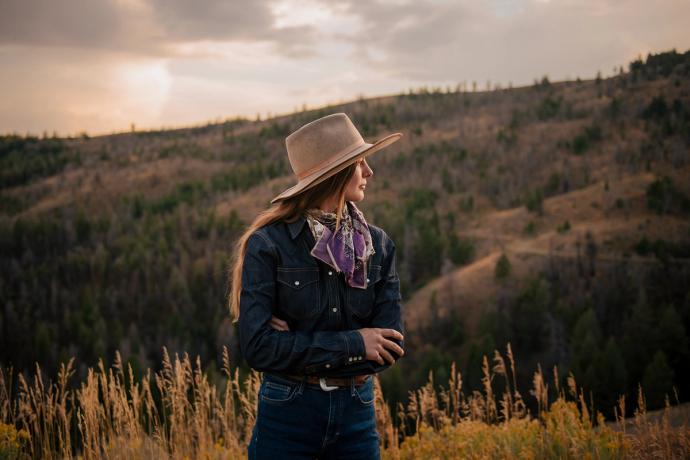
ANNIE:
Some of my earliest memories on the ranch are with my dad. He used to ride around the ranch on his Honda motorcycle to move irrigation dams, check cows, build electric fences, or move a wheel line.
I remember one particular afternoon when I was probably six or seven. Dad was going to check the yearlings out in the field, and I wanted to go with him. Motorcycle rides were always a mix of regret and thrill; regret because Dad would cross the pivot tracks and hotwires faster than was to my liking; thrill because I always felt so safe and happy riding in the front of that motorcycle, it was my way to spend time with my dad.
When we got out into the field Dad went off a few hundred feet away to check the electric fence and the water tank, and I stood there feeling rather small. As I stood there, two hundred head of yearlings came over to see what was happening. Within a few minutes, the motorcycle and I were surrounded by hundreds of curious-faced bovines. I remember freaking out a little because I couldn’t see Dad, and the cows were inching closer and closer. Eventually, Dad turned up, parting the throng of cattle, he laughed when he saw what they were all looking at and said “they’ve never seen anyone so short before.”
MADDY:
Like my sisters, my earliest memories of the ranch are riding up front on Dad’s motorcycle or getting started riding horses not too long after we started walking. We had a trusty old mustang mare named Bonnie who was more than happy to carry three or four of us around at a time. She took care of us, but she taught us some good lessons too.

How has growing up on the ranch shaped who you are as a person?
MELANIE:
The easy answer would be that ranch life taught us all work ethic, but it goes deeper than that. Yes, we all learned that hard work is part of the territory and to appreciate the feeling at the end of a long and physically demanding day. But I also think that ranching has helped me learn to control my emotions and how I react to challenging situations. Especially when we’re all exhausted, it’s easy to focus inwardly on how miserable you are and how hard everything is. But over the years I’ve gotten better about putting that negativity aside because the people we work with (family or otherwise) and the animals in our care come first.
Finally, ranching has led me to appreciate the beauty of the mundane. There is so much loveliness to be found in the smallest things: a summer sunset over green fields, the way sagebrush smells after a rain, the sound of a nighthawk, content cattle full after a good day of grazing, and the weightlessness of a horse totally in sync with what you’re asking of them. I’m grateful that growing up this way has taught me to observe and appreciate how amazing this natural world that surrounds us every day really is.
LINNAEA:
Ranching is both humbling and confidence-building. It’s humbling because there is a lot of responsibility in caring for land and animals. I fail daily, and sometimes mistakes have big consequences. At the same time, it’s so satisfying and empowering to reach the end of a day after doing a difficult job well. I think for me those two things have translated to other jobs or life beyond the ranch. Being willing to admit to mistakes or what I don’t know has made me more open to learning new things, while I also have confidence that I can problem solve through any challenging situations that might come up.

What are you most proud of about the ranch?
LINNAEA:
I think I’m proudest of the way we, and especially my parents, built this place. My sisters and I are only second generation. My parents started with no inherited equity and a determination to make ranching work at a time when many operations were going under. That stubbornness to simply figure it out and question what’s “always been done” led to a lot of out-of-the-box thinking that made our ranch what it is today. They’ve tried to pass that sort of creative thinking on to us daughters, and we’ll need it in the face of today’s rapidly changing technology. I think a lot of people see that change as a threat to ranching, but we see a lot of hope and opportunity here because of the mindset we’ve been raised with.
ANNIE:
I would say one of the things I’m most proud of would be our (or maybe my parent’s) ability to try something different. There are a lot of ways to ranch, and some things just don’t work. It can be difficult to change those things for the better because it doesn’t align with tradition. What we do, by many definitions, is untraditional. I admire my parent’s ability to see something that is not working and try something different.
Inherding was created because we were losing cattle to wolf predation, our riparian areas were struggling, and our cattle weren’t coming off the range as healthy as we hoped. My parents (who are both ecologists) recognized that something needed to change, and ever since, we’ve lived with our cattle all summer.

MADDY:
Knowing how hard we’ve worked to regenerate our rangelands and repair the soil health at the ranch is something that I’ll always be proud of. Seeing riparian areas that were absolutely decimated 10 years ago and now are thriving is a fantastic feeling. The horses that we can turn gentle with a season on the range; the beef we raise and cultivate and the extraordinary flavor that comes from it; the exceptional life that we’ve made are, in my mind, pretty cool.
Ranching is not an easy life, why are you and your family still willing to pursue it?
LINNAEA:
It may not be the easiest way to make a living, but it’s very intrinsically rewarding. It’s a lifestyle that enables us to work together as a family, spend much of our time outdoors, and work with animals. It’s also satisfying in that we feel we’re doing work that matters by producing quality food for people while doing right by our land and livestock.
BECKY:
The main reason that my family keeps ranching is that we really like doing it even though it is a lot of hard work. We enjoy being able to serve our customers by providing them with healthy and good-tasting protein, and we like being able to do it in a way we believe is not only good for human health but also beneficial for the land that we run our cattle on.
MADDY:
There’s nothing more rewarding than seeing results from the hard work that you’ve done yourself. Our ranch’s soil health is improving because of the work we’ve done, and our rangelands provide for us every summer because we’ve put in the time to regenerate them. It only gets better every year and it’s actually somewhat addictive because, as long as we keep doing something right, we’ll keep seeing results.

Is there a person who has been a major inspiration in your life? Tell me about them.
MELANIE:
I would have to say my mom is one of my biggest inspirations. I’ll never understand how she raised all seven of us, homeschooled us from start to finish, and still managed to grow the beef business and the ranch with my dad. She is one of the smartest, most articulate, and most goal-oriented people I know, and her work ethic is unmatched. If she is met with a problem, she finds a solution.
She has struggled a lot with her health and was recently diagnosed with Lyme disease contracted over 30 years ago while completing work for her Ph.D. along the Hudson River. Regardless of that, she has shown up as a mother, a friend, a businesswoman, and a rancher. I’m proud to know her and hope I can one day be half the woman she is.
ANNIE:
There are a lot of people that I look up to, I have so many incredible humans in my life. I’d say that my biggest inspiration comes from my parents. They have had endless visions and ideas that led to what we are today. They have so much passion that they put into protecting the land that we have. They raised us in a place where we could interact with the land and nature. Now, I’ve been inspired by them to carry on with what they started (hence the ecology degree).
My sisters have been my role models throughout my life. From Maddy to Melanie, all my sisters have parts of them that inspire me to improve myself.

For more on how the Elzinga sisters Don’t Go Gently, and more from those who brought you this story, visit:
Words by Katie Hutton - @katie.marchetti.hutton
Photos by Melanie Elzinga - @melzingaphoto
Featuring Alderspring Ranch: @alderspring_ranch
Produced by Modern Huntsman - @modernhuntsman